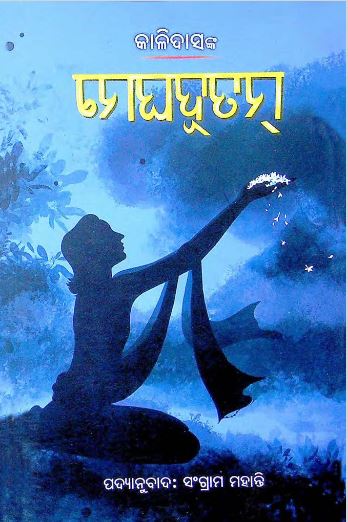Meghadutam, a timeless classic by the illustrious poet Kalidasa, has found a fresh voice through the eloquent translation by Sangram Mohanty in 2022. Originally composed in Sanskrit, this enchanting poem is often celebrated as one of the masterpieces of Indian literature, capturing the quintessence of love, longing, and the beauty of nature.
At the heart of “Meghadutam” lies a poignant narrative that melds human emotion with the grandeur of the natural world. The poem unfolds the story of a separated couple—the Yaksha, a celestial being, is exiled to a remote region, yearning for his beloved, the Yakshini. In his despair, he appeals to a passing cloud to carry his heartfelt message to her, thereby setting the stage for a poignant interplay of love, separation, and hope.
Sangram Mohanty’s translation breathes new life into Kalidasa’s rich imagery and intricate metaphors, making the poem accessible to contemporary readers while respecting its original spirit. Mohanty’s adept command of both languages allows him to retain the lyrical cadence and emotional depth of the original text, ensuring that the essence of Kalidasa’s vision shines through.
Meghadutam can be seen as a collection of intertwined verses that reflect various themes inherent to the human experience. Each section of the poem serves as a standalone piece, yet together they create a cohesive exploration of love’s complexities. The Yaksha’s deep despair transforms into a vibrant tapestry of natural imagery, where he implores the cloud to serve as a messenger, drawing connections not only between the physical and emotional realms but also between nature and human experiences.
The cloud, as the central symbol of the poem, serves as a poetic device that bridges the gap between the lover and his beloved. Kalidasa paints the landscape with intricate details—the scents of blooming flowers, the sound of cascading rivers, and the colorful hues of the sky. Mohanty’s translation captures the delicate nuances of these descriptions, immersing readers into a vivid world where nature and emotion are intertwined.
The underlying theme of longing resonates throughout the verses as the Yaksha pours out his heart. His yearning for the Yakshini transcends mere physical separation; it encapsulates the profound spiritual connection he feels with her. The translator skillfully conveys this sense of longing, allowing readers to feel the depth of the Yaksha’s sorrow as he envisions the reunion with his beloved.
One of the distinguishing features of “Meghadutam” is its ability to transcend time and culture. The themes of love, separation, and the longing for connection are universally relatable, making it an enduring piece of literature that continues to resonate. Mohanty’s translation emphasizes this timelessness, inviting readers from different backgrounds to reflect on their own experiences of love and loss.
In conclusion, Sangram Mohanty’s translation of Kalidasa’s “Meghadutam” offers a renewed appreciation for this classic poetry. Through careful word choice and an understanding of the emotional richness underlying the verses, Mohanty not only honors the original work but also invites a new generation to engage with this beautiful narrative. For those who seek to explore the depths of love and nature through an exquisite lens, “Meghadutam” serves as a magnificent entry point into the world of Odia poetry and the timeless relevance of Kalidasa’s artistry.
Books Info
| Books name | Meghadutam |
| Author | Kalidas; Sangram Mohanty, Tr. |
| No Of pages | 129 |
| Publisher | Swabalamban |
| Publication | 2022 |
| Printed At | Sai Jagannatha Printing Press |
| Distributor | Swabalamban |

